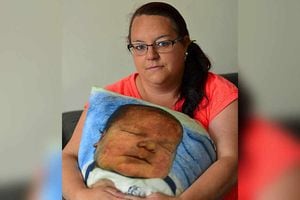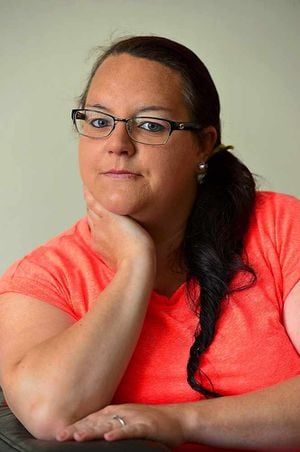Simple test could have saved my baby son, claims Telford mother
A Telford mother who lost her baby boy just 11 hours after he was born said today that a simple test during pregnancy could have saved his life.

Telford's Princess Royal Hospital, where Jack Stephen Burn was born has launched an internal review into why he died.
Jack contracted group B streptococcus, also known as Strep B or GBS, a life-threatening infection for newborns.
Health bosses at The Shrewsbury and Telford Hospital NHS Trust today said routine screening of all pregnant women for GBS was currently "not recommended".
But mother Hayley Matthews, of Chirbury, Stirchley, says the test might have been the difference between life and death for her baby.

She has thrown her weight behind a national campaign that urges a change in medical guidelines to see every pregnant woman tested.
Miss Matthews says the loss of Jack, who survived for less than one day and died on March 16, had "completely devastated" her family.
The 29-year-old, who was swabbed for GBS during labour, told of how it haunts her that his death may have been prevented if the "safe" and "easy" test had been carried out earlier.
Baby Jack died following complications during labour that saw him trapped in the birth canal for four minutes. A post mortem revealed that he had been starved of oxygen and had an infection on the lung and pneumonia caused by Strep B.
Miss Matthews said: "If I'd have been tested for Strep B during my pregnancy they might have picked up on it and given me antibiotics at an earlier stage and this means that Jack might still be alive today."
Cathy Smith, director of the women and children's care group at the Shrewsbury and Telford Hospital NHS Trust, said: "Group B Strep is found naturally in 20 to 30 per cent of people, and can cause rare but tragic outcomes. Evidence suggests that on average 21 per cent of women are carriers of the Group B Strep organism but that only one in 400 women who carry the organism will pass it on to their unborn baby.
"Routine screening of all pregnant women for GBS is currently not recommended by the UK National Screening Committee or the Royal College of Obstetricians & Gynaecologists.
"Women are offered treatment during labour when there are known risk factors where a baby could develop a Group B Strep infection.
"Whilst we cannot discuss individual cases, on behalf of the trust I would like to extend our sincere condolences to the family. An internal review surrounding this sad death is ongoing."
A campaign has been launched nationally to get all pregnant women tested.
Miss Matthews said: "It is just devastating, one minute you are pregnant looking forward to the birth of your son and the next minute you are walking away without him," she said.
"I had to register my baby as a live birth and last week had to register a death."
Miss Matthews criticised health chiefs for the lack of awareness over strep B.
She said: "I had never even heard of it before I read the words 'strep B' on the post mortem report and when I looked it up I was shocked at what a common thing it was.
"So many babies die from this and it seems to be ignored by our health service. Only some women are tested before they go into labour and if I'd been one of those women my son might still be here."
Miss Matthews had a trouble-free pregnancy until she was rushed into hospital three days before the death of Jack on March 16.
She was induced at around midnight on Saturday but during labour Jack, who was born weighing a healthy 8Ib 3oz, became stuck for around four minutes.
She said: "The post mortem said he had strep B and through it he had got a lung infection and pneumonia.
"He was distressed for 20 minutes before delivery.
"I was at the hospital every month and all the checks were fine nothing was picked up."
A petition has attracted thousands of signatures to urge the UK Government to make it a legal requirement to screen every pregnant woman and give antibiotics to high-risk mothers when delivering their baby.
Other countries such as America and Australia already have this procedure in place, but the UK National Screening Committee does not believe a screening programme would be necessary or effective. A review into the issue was scheduled for 2015/16, but Cathy Smith, director of the women and children's care group at the Shrewsbury and Telford Hospital NHS Trust, said her staff currently followed recommendations that no screening is necessary,
Group B Strep infections are thought to affect one in every 2,000 births and one in every 10 babies with the infection will die.
But a "safe and easy" test is required to find out if an expectant mum is carrying it.
The charity Group B Strep Support campaigns for better awareness of the devastating infection.
It wants to see every pregnant woman informed and given the opportunity to be tested between 35 and 37 weeks of their pregnancy.
And if it is detected during a woman's pregnancy, the charity wants antibiotics to be offered in labour to minimise the risk of infection in the baby.
Miss Matthews said: "I've been suffering with depression since Jack's death, it's hit my family so hard.
"I can't get rid of the thought that things might have been different if I'd been tested earlier. I had no internal checks or anything. I just wish that something could have been done earlier."
Little Jack has been buried at Castle Green, Woodside, Telford.





